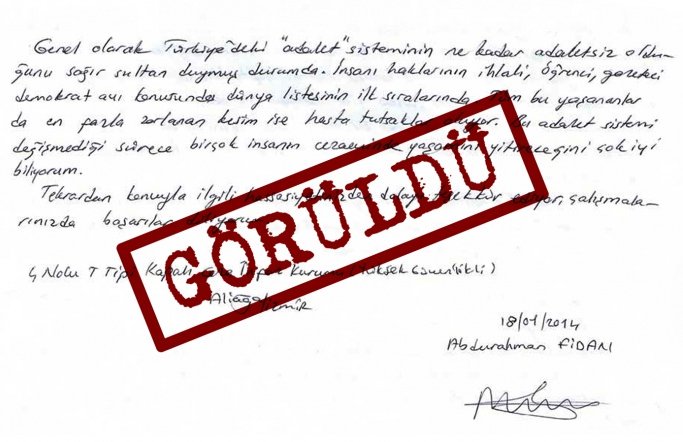Click to read the article in Turkish
The Constitutional Court has acknowledged that uploading the letters of an arrested person to the National Judiciary Informatics System (UYAP) constituted a "violation of the right to respect for privacy and freedom of communication" and accepted the application.
According to the ruling published in the Official Gazette, Ümit Karaduman, who was arrested in the Tekirdağ No. 1 Type T Closed Penal Institution on charge of "organization membership", applied to the Tekirdağ 2nd Judgeship of Execution and requested that the letters sent to and by him no longer be uploaded to the UYAP system and the uploaded letters be deleted.
In his petition, Karaduman noted that there was no legal foundation based on which the letters were permanently uploaded to the system, underlining that it "violated the right to respect for privacy and presumption of innocence". Examining the application, the Judgeship of Execution concluded that the related situation was not contrary to the Constitution.
The appeal of prisoner Karaduman against this ruling was rejected by the Tekirdağ 2nd High Criminal Court. In response to this, he made an individual application to the Constitutional Court on the grounds that "his right to respect for privacy and freedom of communication was violated by the penal institution's uploading of his all letters to the UYAP system".
Examining the application, the top court has concluded that the applicant's "right to respect for privacy and freedom of communication", as guaranteed by Articles 20 and 22 of the Constitution, was violated.
The Constitutional Court has ruled that the ruling shall be sent to the Tekirdağ 2nd Judgeship of Execution to eliminate the consequences of the violation. But the top court has rejected his request for damages.
Emphasis on 'clear and detailed rules'
In the justified ruling of the Constitutional Court, it is noted that the letters of prisoners are uploaded to the UYAP under the Law of Criminal Procedure, Law on the Execution of Sentence and Security Measures and Bylaw on Administration and Security Measures of Penal Institutions.
The ruling has indicated, "...considering that the written correspondence of prisoners may contain information desired to remain confidential and to be categorized as personal data, the laws foreseeing restrictions on prisoners' basic rights and freedoms shall be in such a form that the fundamental rules and principles about the issue are determined..."
According to the ruling, "In the concrete case, the written correspondence of the prisoner that was not found objectionable, contained his personal information and was not related to the judicial proceedings was uploaded to the UYAP ... led to a diversion from the rule stipulating that it shall be determined based on whether the letter was objectionable or not."
The top court has noted that "there is no clear legislation foreseeing a period during which the prisoner's correspondence shall be kept in the system, the conditions under which it shall be accessed and used by third parties, the authorities with which it shall be shared by the penal institution and the ways in which personal data and privacy is to be protected".
Finding ambiguities in practice as well, the Constitutional Court has concluded: "Within the context of these statements, it has been concluded that the intervention has no legal foundation. It has been concluded that the right to respect for privacy and freedom of communication has been violated on the aforementioned grounds". (HA/SD)






132.jpg)